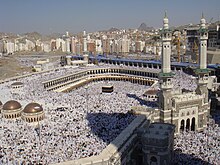A pilgrimage is a journey to a holy site, originally for religious reasons, nowadays often for a more vague spiritual experience.
Understand
[edit]Before the advent of rail travel and steamships in the 19th century, long-distance travel was hardly a pleasure, and many of those who ventured far from home were motivated by faith. A pilgrimage was, and still remains, a way to find redemption, wisdom, or the meaning of life. Though modern pilgrims can travel fast and comfortably to sacred places, some might, literally and figuratively, choose the narrow path. Some pilgrimage routes have become destinations in their own right as has the "travel infrastructure" of yesteryear – whether it is still in use as such or not. Many pilgrimage routes are also open – and indeed often travelled on – by those of a different faith or no faith at all. Other routes and destinations are off-limits to those outside the religion either year round or during special occasions.
Christian pilgrimages
[edit]- See also: Christianity#Pilgrimages
In medieval times, pilgrimages were an established tradition. Several of the historic pilgrimage routes have been revived, and in addition to traditional pilgrimage, many walk then for reasons other than purely religious ones, such as with cultural, more general spiritual or personal motives.
Famous and important Christian pilgrimages include those to the Holy Land, the Way of St. James to Santiago de Compostela in Spain, pilgrimages to Rome. Other pilgrimages in Europe include the Nidaros Path to Norwegian Trondheim and Via Maria in Central and Southeastern Europe.
Hindu pilgrimages
[edit]
Pilgrimage, often called "yatra", has been commonplace in Hinduism due to the presence of numerous sacred sites. Famous ones include Amarnath Yatra, Char Dham Yatra, Deoghar Yatra, Kailash Yatra, Kashi Yatra, Kanwar Yatra etc. The sites are heavily crowded during pilgrimage, so be prepared when you travel these sacred sites.
Kanvar Yatra is India's largest religious festival, when hundreds of thousands of devout Hindus travel to the holy city of Varanasi to obtain sacred water from the Ganges river and then take it across the country to give as offerings to various Shiva shrines.
Islamic pilgrimages
[edit]
The main and best known pilgrimage for Muslims is the Hajj, which is mandatory for all Muslims at least once in their lifetimes if their health and financial circumstances allow for it. While the Hajj must be performed during the Dhu al-Hijjah; a lesser Hajj, known as Umrah, can be performed any time of the year. There are also other Islamic pilgrimages, some relevant only for specific denominations.
Buddhism
[edit]The following four are considered the holiest places in Buddhism.
- Lumbini, Nepal — birthplace of Buddha.
- Bodh Gaya — place of his enlightenment.
- Sarnath — place of his first religious speech.
- Kushinagar — place of his death.
- Buddhism in Japan
Other religions
[edit]- Shinto in Japan
- Ise shrine
- Izumo shrine
- Kumano Kodo
- The Chinese sea goddess Mazu's Temple in Fujian
Non-denominational
[edit]See also
[edit]- Religion and spirituality
- Sacred sites of South Asia — for Buddhism, Hinduism and Islam

